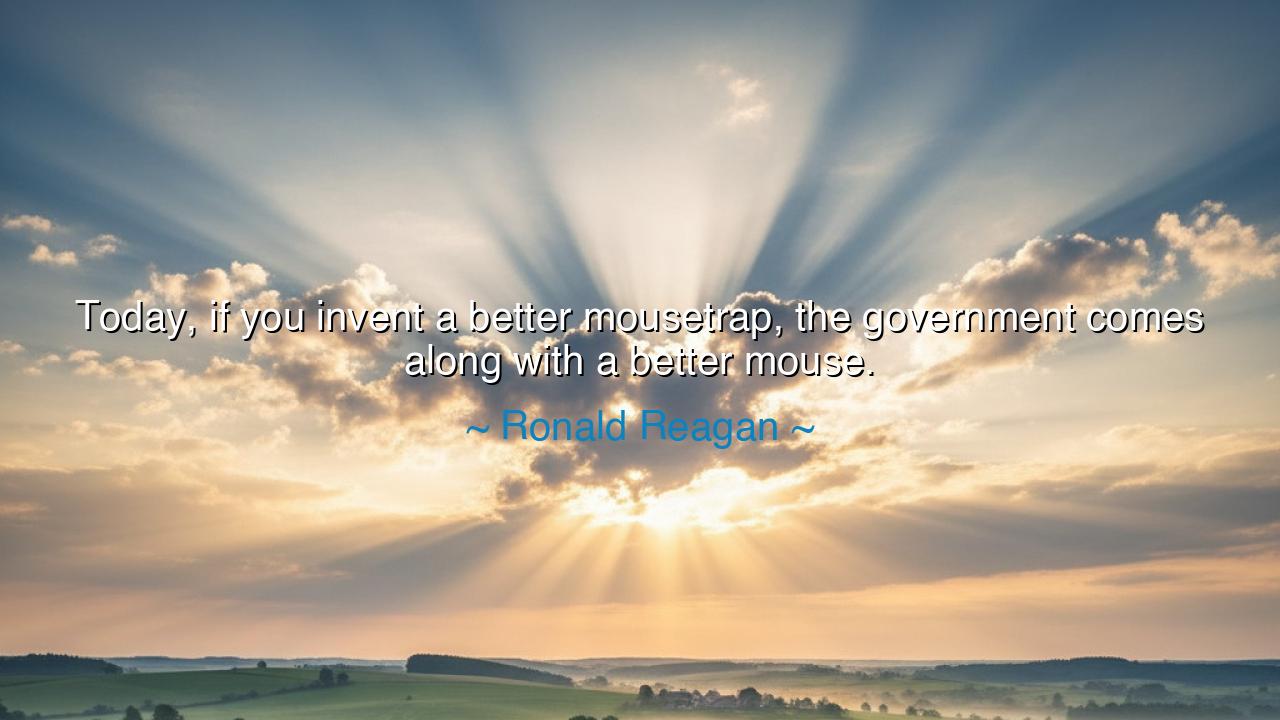
Today, if you invent a better mousetrap, the government comes
Today, if you invent a better mousetrap, the government comes along with a better mouse.






"Today, if you invent a better mousetrap, the government comes along with a better mouse." – Ronald Reagan
In this wry and unforgettable saying, Ronald Reagan, the 40th President of the United States, captures with humor a profound truth about the tension between innovation and bureaucracy. His words transform a simple image—the classic “better mousetrap”, long a symbol of human ingenuity—into a commentary on how government, instead of nurturing creativity, often becomes its greatest obstacle. Reagan’s tone is witty, but beneath the jest lies a deeper lament: that where free minds build and create, bureaucracy too often steps in, not to assist, but to entangle and compete.
The origin of this quote reflects Reagan’s lifelong philosophy of limited government and free enterprise. He had seen, as an actor, governor, and president, how government regulation, however well-intentioned, could stifle progress. The original proverb—“If you build a better mousetrap, the world will beat a path to your door”—celebrated the power of invention and the natural rewards of merit. But Reagan’s adaptation of it turns that optimism on its head. In his version, the innovator’s triumph is met not with admiration, but with interference. The “better mouse” becomes a symbol of bureaucracy—clever in its own way, but designed to thwart, not support. It is a critique of government overreach, warning that excessive control can turn progress into frustration.
The deeper meaning of this quote lies in its understanding of human nature. Innovation thrives on freedom—freedom to experiment, to fail, to build anew. Government, by its very structure, values order and control. When these two forces collide, the creative spirit often suffers. Reagan’s remark, then, is not merely about policy; it is about the eternal struggle between the individual and the institution, between the dreamer’s imagination and the administrator’s caution. His humor carries a heroic undertone: that true progress belongs to those who dare to create, even when the powerful make it difficult.
History has many examples that echo Reagan’s point. Consider the story of the Wright brothers, whose fragile dream of flight was dismissed and hindered by officials and experts who doubted its worth. Government contracts were instead given to large, well-connected companies that failed repeatedly, while the Wrights—two humble mechanics—built the first flying machine. Only after success did the institutions rush to claim credit. It is a tale as old as civilization: pioneers labor in obscurity while systems awaken too late, often seeking to control what they once ignored. Reagan’s quip reminds us that this pattern persists—that bureaucracy, when unchecked, risks becoming an adversary of the very progress it claims to manage.
Yet his quote should not be read as disdain for all government. Reagan, like the ancients who prized balance in all things, believed that government has its rightful place, but that its role is to safeguard liberty, not to compete with it. When the state forgets that it is the servant and not the master, it begins to act like the “better mouse”—ingenious in finding ways to trap those who build, tax those who succeed, and regulate those who innovate. His jest thus becomes a moral lesson: that freedom, not control, is the mother of invention.
Reagan’s insight speaks not only to policymakers but to every generation. The spirit of progress does not flourish in permission; it flourishes in possibility. Those who create—the inventors, artists, scientists, and entrepreneurs—must resist the inertia of bureaucracy by holding fast to their vision. For though the “better mouse” may delay them, it cannot stop them if they persist. The true builder, like Prometheus stealing fire, will always find a way to bring light into the world.
The lesson is clear: protect creativity from suffocation. Governments must learn humility—to guide without strangling, to protect without possessing. Citizens, too, must remain vigilant, reminding their institutions that innovation is not a threat but a gift. Each of us, in our work and daily life, should nurture the courage to create freely, to stand firm against the forces that would make life safe but small.
For in the end, Reagan’s humor conceals a heroic truth: that civilization advances not by the cleverness of its bureaucrats, but by the daring of its dreamers. The world will always need better mousetraps—symbols of human progress—and must guard against the “better mice” that would gnaw away at our freedom to build them. Let his words endure, then, as a warning and a blessing: to cherish liberty, to defend innovation, and to keep faith in the boundless potential of the individual mind.






AAdministratorAdministrator
Welcome, honored guests. Please leave a comment, we will respond soon